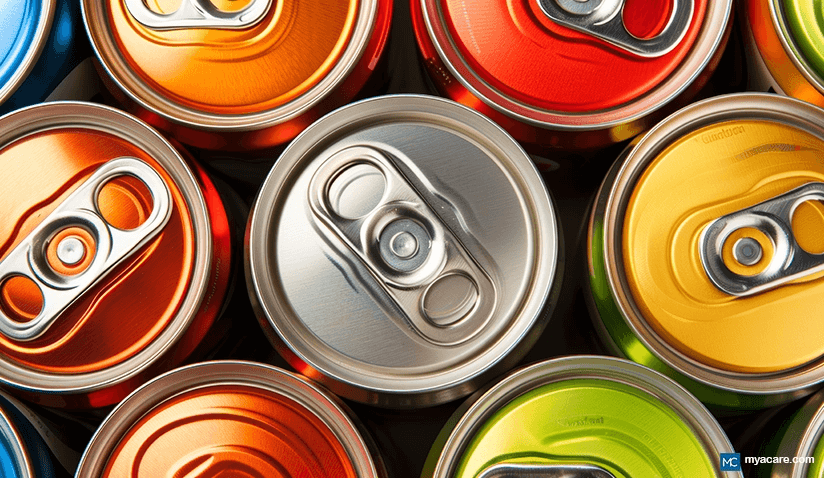How Energy Drinks Impact Your Health

Energy drinks are non-alcoholic beverages used to improve physical and mental stamina. These drinks are heavily marketed and are targeted at young adults. In 2018, the global energy drink market was valued at USD 53 billion and is estimated to reach USD 86 billion by 2026. As demand for energy drinks increase, there is a growing concern about their impact on health. In this article we discuss how energy drinks impact our body functions.
A growing trend among young adults
Energy drinks were first introduced by Dr. Enuf in 1949 in the US as alternatives to sugar sodas. In the 1960s, the energy drink Lipovate D dominated the market in Japan. In 1997, an Austrian entrepreneur introduced ‘Red Bull’ which developed the market for energy drinks. At present, more than 300 varieties of energy drinks are available in the US, and countries such as India, China, and Brazil are considered growing markets for energy drinks.
In the US, adolescents between 12-17 years of age and males between 18-34 years of age are most regular consumers of energy drinks. They consume these drinks at least weekly or sometimes even daily.
Constituents of energy drinks and their effects:
Energy drinks mainly contain caffeine, plant-based stimulants (Guarana, Yerba mate), sugars (Glucose, Fructose), natural glucose metabolite (Glucuronolactone), amino acids (Taurine, carnitine, creatine), herbs (Ginkgo biloba, Ginseng), vitamins (Vitamin B3, B6, B12). The ingredients help improve physical stamina, alertness, and energy levels during exercise. They reduce mental fatigue, keep one awake, and act as a mood elevator. The ingredients also improve memory, concentration, alertness while driving, and reaction time. However, the constituents also have some adverse effects.
Caffeine: The quantity of caffeine present in energy drinks varies between 75- 150mg per 8 ounces (~240 ml). Most energy drinks are available in 16 ounces cans (~475ml) or 2-2.5 ounces (75-80ml) of energy shots. The maximum recommended dose of caffeine in adolescents is 100 mg/day and in adults is up to 400mg/day. Caffeine tolerance may vary between people. However, some people may develop adverse effects with the intake of 200mg-500mg of caffeine.
- Benefits: When taken within recommended doses, caffeine helps improve physical and mental endurance by increasing the production of adrenaline. It acts by blocking the effects of chemicals (e.g., adenosine) that make one feel tired, increasing mental alertness and elevating the mood. On ingestion, it is rapidly broken and absorbed from the gut into the bloodstream, and energy is distributed to the entire body.
- Adverse effects: Excess consumption of caffeine can cause caffeine intoxication that causes restlessness, nervousness, sleeplessness, irregular heartbeats, muscle twitching, cardiovascular and psychomotor disorders.
Guarana: This plant-based extract large amounts of caffeine and small amounts of other constituents (e.g., theobromine, theophylline, saponins, flavonoids, and tannins). One gram of Guarana is equivalent to 40 mg of caffeine.
- Benefits: Its consumption increases physical and mental performance. It also assists in weight loss.
- Adverse effects: The adverse effects are similar to caffeine intoxication.
Yerba mate: It is a plant-based central nervous system stimulant as it contains a high concentration of caffeine.
- Benefits: It is known for its anti-inflammatory, anti-diabetic, and anti-oxidative properties.
- Adverse effects: Research suggests that Yerba mate may increase the risk of cancer.
Ginseng: It is an herbal supplement.
- Benefits: It is known for its performance-enhancing effects.
- Adverse effects: Excessive intake causes high blood pressure, insomnia, disturbance in the menstrual cycle, palpitations, edema, headache, and dizziness.
Others: D-glucuronolactone and taurine are other constituents of energy drinks. They have antioxidative properties. However, insufficient data is available on their effects.
Adverse effects of energy drinks on overall health
Excess consumption of energy drinks impacts many body functions. Below are the details of the associated symptoms:
Cardiovascular system:
- Exposure to excess caffeine in energy drinks impairs the function of cells lining the blood vessels, causing narrowing of blood vessels and increasing the risk of blood clots.
- An increase in the levels of adrenaline due to caffeine increases heart rate and blood pressure and stimulates the release of glucose from energy reserves in the body. Hence, people with existing cardiovascular disorders should avoid the intake of energy drinks.
- Increased consumption of energy drinks has been reported to increase the incidence of arrhythmias (abnormal heartbeats) and sudden cardiac arrests (especially triggered while combining multiple energy drinks and exercise) in healthy people.
Neurological system:
- Excessive consumption of caffeine in energy drinks can cause seizures, anxiety, irritability, agitation, lightheadedness, restlessness, depressive moods, and insomnia.
- Overdose can lead to manic episodes or psychomotor unrest in patients with existing psychiatric conditions.
- In severe cases, bleeding within the brain (intracerebral hemorrhage) is reported.
Gastrointestinal system:
- Patients may complain of stomach upset, nausea, vomiting, diarrhea, and abdominal pain.
Renal system:
- The caffeine in the energy drinks surge the filtration of fluids by kidneys, causing excess fluid loss via urination. Hence, energy drinks should be avoided during prolonged exercises as they may lead to dehydration.
- Acute renal failure and metabolic acidosis (increased acid levels in the body) are some of the other side effects of energy drinks.
Endocrine system:
- Research suggests people are at risk of developing obesity and diabetes with the consumption of excess sugars from energy drinks. Caffeine also decreases insulin sensitivity in the whole body, increasing the risk of diabetes.
Dental:
- The pH of energy drinks is acidic (~5.5), so excess intake can cause erosion of enamel present on the tooth surface causing tooth sensitivity.
- Increased intake of sugars in energy drinks and demineralization of enamel increase the risk of tooth decay.
For safe consumption and to prevent adverse effects, the American College of Sports Medicine (ACMS) has endorsed several recommendations regarding energy drinks.
Here are the recommendations:
- Energy drinks should not be consumed by vulnerable populations such as people younger than 18 years of age, pregnant and breastfeeding mothers, caffeine-sensitive people, or one with existing cardiovascular are other severe medical conditions.
- Energy drinks should be avoided during or after strenuous exercises.
- Energy drinks that are pre-mixed ingredients of alcoholic beverages should be avoided. (Research suggests that energy drink users tend to crave for more alcohol when energy drinks are combined with alcohol).
- Weight watchers or ones trying to lose weight should monitor the intake of energy drinks as they contain high levels of sugars and calories.
- Energy drinks should be avoided during bedtime to enjoy undisturbed sleep.
- Excessive or rapid consumption of energy drinks should not be marketed.
- Awareness regarding the adverse effects of energy drinks should be promoted in schools and colleges. Health care workers or physical trainers should inform their clients about the potential side effects of energy drinks.
Conclusion:
Considering the growing popularity of energy drinks, one should understand their adverse effects. Adolescents or young adults should be well-educated, and more awareness should be created regarding the benefits and adverse effects of ingredients present in the drinks.
To learn more about the immune system and how it functions, talk to a doctor. To search for the best doctors and healthcare providers worldwide, please use the Mya Care search engine.

Dr. Shilpy Bhandari is an experienced dental surgeon, with specialization in periodontics and implantology. She received her graduate and postgraduate education from Rajiv Gandhi University of Health Sciences in India. Besides her private practice, she enjoys writing on medical topics. She is also interested in evidence-based academic writing and has published several articles in international journals.
References:
Featured Blogs



